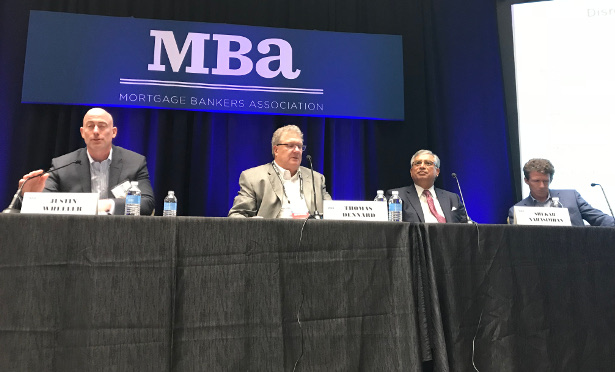
SAN DIEGO—Technology is the biggest disruptor the commercial real estate industry will face, but simple data collection is not unique enough; we need to use technology in a way that gives companies a competitive advantage in the marketplace, said speakers at the MBA CREF/Multifamily conference Tuesday. Panelists for the session “Disruptors, Innovation and Managing Change in CRE Finance” tackled what they believe are the significant current and future drivers of change in CRE finance and ways to navigate through the shifting landscape.
Moderator Justin Wheeler, CEO of Berkadia, asked the panelists to define disruption in CRE. Thomas Dennard, chairman of the board and CEO of Grandbridge Real Estate Capital LLC, said we just witness a whole lot of disruption since the recession and we will continue to see more of a free-market environment. He added that Millennials are the future of our industry.
Shekar Narasimhan, managing partner of Beekman Advisors Inc., said disruption is the result of taking a problem, turning it on its head and solving it; this is how simple ideas get elevated into multi-billion-dollar businesses. Willy Walker, chairman and CEO of Walker & Dunlop, added that there are competitors looking to disrupt what we do every day. “There are upstart companies [like Walker & Dunlop],” which many never would have predicted would succeed, but have. “This is an industry ripe for disruption. There are too many people” involved for it to continue without these disruptors.
Narasimhan pointed out that GPS is the biggest invention of his lifetime. “Could you exist without GPS today?” But, he said, we need neurodiversity. With that, change will be so ubiquitous that we won't even notice it.
Walker said what distinguishes people, products and companies in the era of technology is not simply the ability to eliminate paper from the workplace—everyone can do this, so there's no competitive advantage—but to improve things in a way that puts them ahead of everyone else. Dennard added that it's a matter of how quickly you can get your people to adopt a technology that will make the difference.
Wheeler asked if tech replaces a bunch of people, and Narasimhan said, “Technology doesn't eliminate jobs; it eliminates professions.” The speed to change for CRE has been slower than in other industries because our industry is such that it can't grow as fast as technology has (e.g., the rate of growth in the number of Facebook users over time). He added that loan officers will likely lose out to technology.
Walker said the traditional way of investors meeting with their life companies before disbursing capital has to end, but they will need a trusted advisor to guide them through the process. Technology has an impact in ways we may not even begin to imagine—for example, the iPhone has impacted Invisalign sales since people are taking so many selfies and want their teeth to look good. “It's not so much that we can get online to sell, but the ancillary bites will crop up to feed that.”
Dennard said it's all about efficiency, the but human touch is still very important. While robotics can do certain tasks well, people are much more efficient and can do more with less. We can decide what our niche is, service it and do it better than anyone else. Also, the cost to process a loan is coming down.
Walker said, “But the big controllers of capital will continue to consolidate capital,” and Dennard said, “They may find out it's not as efficient toe run debt through a proprietary arm.”
Wheeler said we will always need that human touch. No how much bandwidth we install, we still need that last mile of copper to reach each individual door.
When discussing which innovation excites them the most, Walker answered, “Real-time data that allows people to make decisions that make a difference,” and Narasimhan said, “The intermediaries of the future will act as fiduciaries.”
Walker said this used to be a clubby industry, and client relationships are sticky, but platforms that provide efficiencies will help. “The biggest mistake I've seen is tech companies thinking they can do everything. We need to be realistic about disintermediating the entire industry—you'll fall on your face if you try.”
Narasimhan said just being big is not going to be sufficient in the future; companies need to take advantage of the partnerships they create to generate a network that makes them unique.
Another innovation that will have great impact on CRE, the panelists said, are driverless cars, which will spark a reuse of parking garages into buildings. Dennard said owners will need to figure out what to do with parking garages in order to make money on the space. Blockchain, on the other hand, will not change everything in CRE finance or US currency, they agreed.
© Touchpoint Markets, All Rights Reserved. Request academic re-use from www.copyright.com. All other uses, submit a request to [email protected]. For more inforrmation visit Asset & Logo Licensing.






